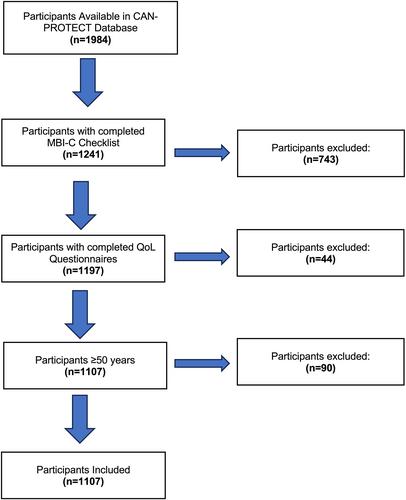Mild behavioral impairment (MBI) is a dementia risk indicator in older adults characterized by later-life emergent and persistent neuropsychiatric symptoms. Quality of life (QoL) is a multi-dimensional concept encompassing physical, spiritual, and emotional well-being. QoL aims to measure and quantify perceptions of individual health, well-being, standard of living, personal fulfillment, and satisfaction. As MBI symptoms may arise from early-stage neurodegenerative disease, MBI may contribute to declining QoL before dementia onset. In this study, we investigated the relationship between symptoms of MBI and QoL in older adults.
The sample comprised 1107 individuals aged ≥ 50 years from the Canadian Platform for Research Online to Investigate Health, Quality of Life, Cognition, Behavior, Function, and Caregiving in Aging (CAN-PROTECT). Multivariable linear regressions were used to model the associations between MBI symptom severity (exposure), measured using the MBI Checklist (MBI-C), and QoL (outcome) assessed by the EuroQol-5D (EQ-5D, higher score = poorer QoL) and the novel Quality of Life and Function Five Domain Scale (QFS-5) (QFS-5, lower score = poorer QoL). Covariates were age, sex, cognition, education, ethnocultural origin, marital status, employment status, high blood pressure, heart disease, and diabetes. Moderation analysis explored potential sex differences. A sensitivity analysis was performed removing anxiety/depression items from the EQ-5D score.
Across the sample (mean age = 64.4 ± 7.2, 79.4% female) every 1-point increase in MBI-C score was associated with a 0.06-point standard deviation (SD) increase in EQ-5D score (95% confidence interval (CI): 0.05–0.06, p < 0.001) and 0.08 SD decrease in QFS-5 score (95% CI: −0.09 to −0.08, p < 0.001). Neither association depended on sex (p = 0.59 and p = 0.41, respectively). The association remained significant after removing anxiety/depression items from the EQ-5D score (β = 0.04, 95% CI: 0.03– 0.04, p < 0.001).
The study shows that MBI is associated with poorer QoL, independent of sex, on two QoL scales. We addressed depression/anxiety items in the EQ-5D as a potential confounder for the observed MBI-QoL association by conducting a sensitivity analysis that excluded those items from the EQ-5D total score and by employing a novel measure of QoL (QFS-5) that excludes psychiatric symptoms from measurement of QoL. Associations of MBI with the novel QFS-5 were similar to associations between MBI and the EQ-5D. Finding interventions to reduce the burden of MBI symptoms might improve quality of life.


